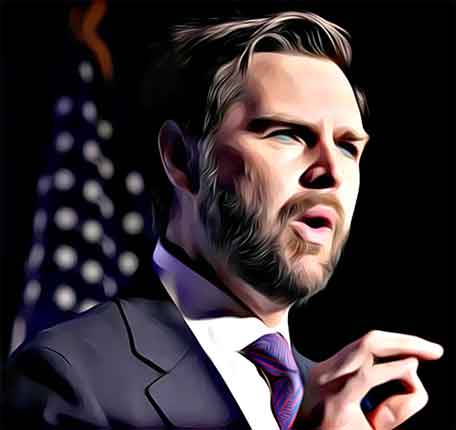
In his speech at the Republican convention, vice presidential nominee J.D. Vance trespassed against one of the foremost cliches in American life — that our country is simply an idea.
Vance said of the people he grew up with in Appalachia, "They love this country, not only because it's a good idea, but because in their bones they know that this is their home, and it will be their children's home."
He invoked the family cemetery plot in eastern Kentucky, encompassing generations of the Vance family.
"That is our homeland," he said. "People will not fight for abstractions, but they will fight for their home."
This isn't quite right. People do indeed fight and die for abstract ideas (see, for instance, the French Revolution and the wars that convulsed Europe in its aftermath).
Yet, Vance is correct that people are motivated, in all times and places, to fight for their homes, and that America is more than the sum of our national ideals.
These propositions should be considered truisms but were too much for Vance's critics.
MSNBC's Alex Wagner called this passage an "Easter egg" of "white nationalism."
America, she continued, is not a group of people with a shared history, but, rather, "a lot of people with different histories, different heritages." Vance doesn't understand this, supposedly, because he's "someone who fundamentally believes in the supremacy of whiteness and masculinity."
E.J. Dionne of The Washington Post found Vance's riff "troubling." Chris Lehmann of The Nation thought Vance's speech took a "blood-and-soil turn." Substacker John Ganz headlined his post on the speech, "This Land is Mein Land."
The left's painting Biden as a monster for not dropping out — but Joe's just being Joe
These critiques are thoughtless, ahistorical and utterly removed from the lived reality of Americans. Our common associations — a common language, history, culture and land — matter a great deal, and acknowledging as much isn't quasi-fascism.
What do the commentators repelled by Vance think Abraham Lincoln was getting at with the finale of his First Inaugural?
If Lincoln spoke today of the "mystic chords of memory, stretching from every battle-field, and patriot grave, to every living heart and hearth-stone, all over this broad land," he'd probably be accused of a dog whistle, too. (Even worse, Lincoln referred to America as "the national homestead.")
If ideas and institutions are all that count, we should love the countries of the G-7 — fellow advanced liberal democracies — as much as the United States, and be just as comfortable living in those countries as we are here. Most of us don't and aren't because the United States . . . is our home.
In addition to our founding documents, we treasure our national heroes, our rituals and holidays, our memorials and our landscape, while we are further bonded to this place because our forebears lived and died here and our children and grandchildren will, too.
Yes, we are constantly replenished by new arrivals, but so is any family or home. J.D. Vance, who married the child of immigrants, doesn't need to be lectured about this. He spoke of his wife and biracial children eventually resting in that same eastern Kentucky plot.
John Thornton Kirkland, a future president of Harvard, captured all of this well in a 1798 speech: "We have learned to love our country, because it is our country; because we are near it, and in it, and have an opportunity of being useful to it; because we breathe its air and share its bounties; because the sweat of our fathers' brows has subdued its soil; their blood watered its fields, and their revered dust sleeps in its bosom; because it embraces our fathers and mothers, our wives and children, our brothers and sisters; because here are our altars, and here our firesides; because patriotism is the combined energy of the social affections, and he who can tear it from his heart, commits sacrilege upon his nature."
That J.D. Vance saying the same thing is now controversial says much about how our national self-conception has gone off the rails.
(COMMENT, BELOW)


 Contact The Editor
Contact The Editor
 Articles By This Author
Articles By This Author